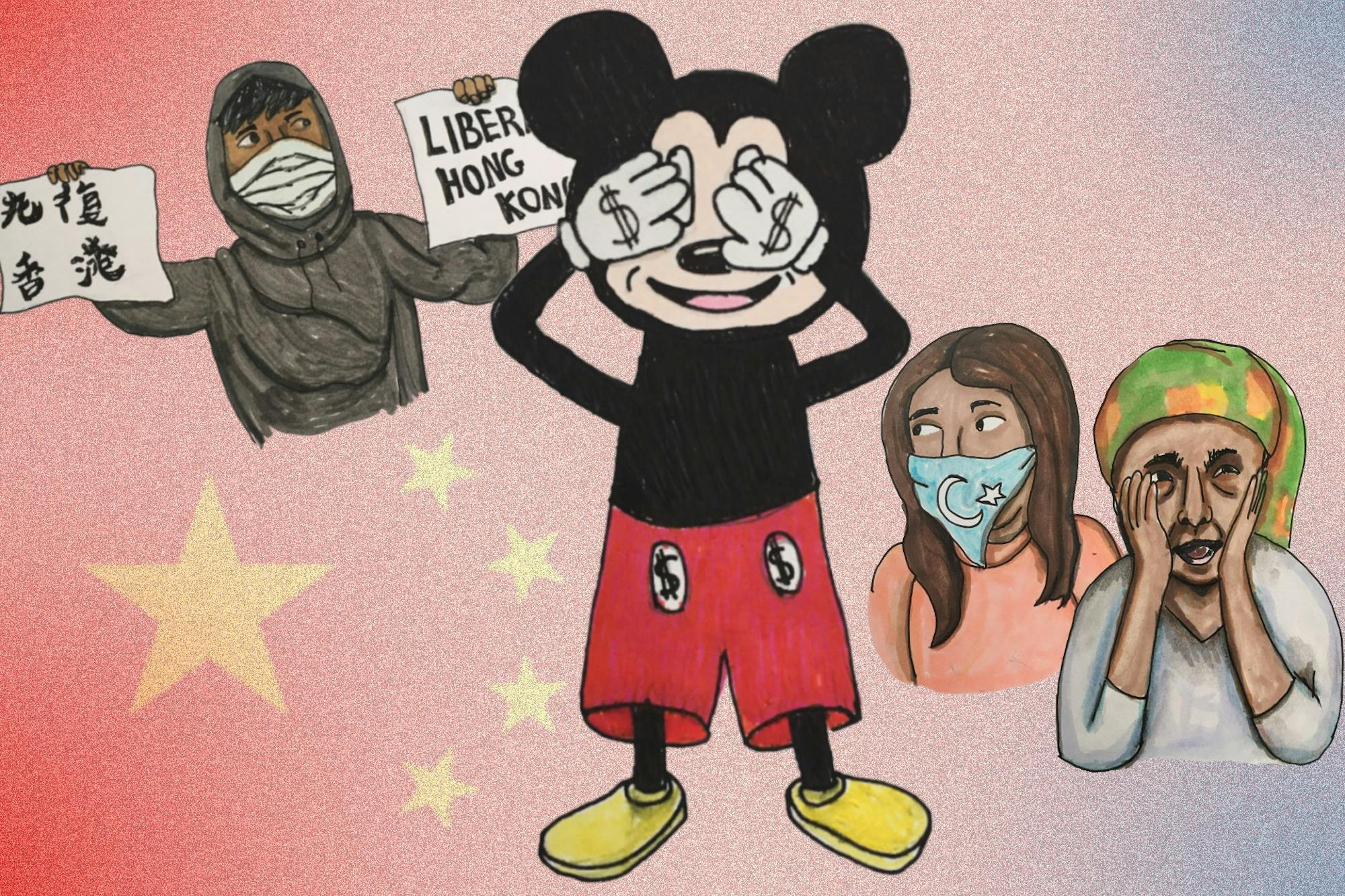In late 2018, the production crew of “Mulan,” the latest soulless Disney live-action remake, began filming in the Xinjiang province of northwest China, home to the Uighur people. At that same time in Xinjiang, the Chinese Communist Party continued to sharply expand internment camps for ethnic Uighurs, camps that had already incarcerated up to one million members of the predominantly-Muslim minority group.
In those internment camps — which became public knowledge by 2018 and remain active — Uighurs are detained without trial, forced to learn Mandarin, forbidden from practicing their faith and made to listen to lectures and sing hymns exalting the CCP, methods that can only be described as gross human rights violations. The goal? To erase Uighur identity and culture through forced assimilation. If you’re a decent person, this should make your blood boil. If you’re Disney, it’s apparently nothing worth getting in the way of good business.
“Mulan” was officially released on the streaming service Disney+ on Sept. 4. In its closing credits, the film gave “special thanks” to eight government bodies in Xinjiang for their assistance in making the movie, including several from Turpan — a city harboring at least four internment facilities as of 2019. Human rights activists and general good folk alike were enraged by Disney’s eagerness to please the CCP, taking to social media to call for a boycott of the movie. I too have taken up that call, and I implore all readers to do the same. Disney’s “Mulan” is a clear example of business first, human rights-last morality; we cannot allow it to succeed commercially and normalize such blatantly unethical behavior within the entertainment industry.
Besides collaboration with an authoritarian regime whose list of human rights violations is as long as the wall that sprawls across its countryside, there are three other good reasons why you should be invested in the commercial failure of “Mulan.” The first is that, to add insult to grievous injury, Disney is as unapologetic as the CCP about what they’ve done. When asked about the growing controversy surrounding the movie, Disney CFO Christine McCarthy went on the defensive and denied doing any wrongdoing at all, claiming that filming in China requires government permission and that “it’s common to acknowledge in a film’s credits the national and local governments that allowed you to film there,” as if that simple industry nicety is enough to cleanse Disney of their choice to film in the location of an ongoing cultural genocide and to cooperate with the government perpetrating it.
To top it off, McCarthy ended her statement by downplaying the significance of the controversy.
“It has generated a lot of publicity,” McCarthy said. “Let’s leave it at that.” I’m sure it would be very convenient for McCarthy and the rest of Disney if the public did choose to simply “leave it at that,” but unlike them, there are a lot of good people out there who won’t stand for such reckless corporate depravity.
The second reason you should not watch “Mulan” is that this isn’t even the first human rights controversy to plague the film. Back in 2019, calls to boycott “Mulan” first began after actress Liu Yifei, who plays the titular character, voiced her support on social media for the Hong Kong police, who have been heavily criticized for their excessive use of force against pro-democracy demonstrators amid China’s escalating crackdown on the autonomous territory. When the main actress of a film supports a group whose conduct has been condemned by international organizations like the United Nations Human Rights Office of the High Commissioner, Amnesty International and Human Rights Watch, I think it’s fair to consider financially supporting such a film an act of passive approval for such opinions. By toeing the party line of an oppressive government, Yifei has proven that, unlike the character she plays, she is no heroine of the people.
The third reason, beyond the film’s ethical controversies, is how Disney chose to distribute “Mulan.” If, after reading up to this point, you still wanted to watch “Mulan,” you would first have to buy a subscription to Disney+, which costs $69.99 per year, and then pay a $30 “premier access” fee to view the movie. (The film will become free to stream for all Disney+ subscribers on Dec. 4.) If this model is profitable, we could see other major blockbuster releases doing the same thing, which would be a massive blow to the accessibility of the medium and a big headache for the average moviegoer. Imagine a world where theaters have become obsolete, and every movie gets released on demand for about three times the price of a single theater ticket, all because of a wealthy minority that’s able to make such a model profitable. The thought makes me shudder.
Robert Thompson, a pop-cultural historian and director of the Bleier Center for Television and Popular Culture at Syracuse University, said in an interview that this move is an experiment in the movie industry on gauging just how much they can charge audiences for this kind of blockbuster release.
“What Disney is doing now is feeling out whether the market will support that $30 price — listening to how many complaints they get, but more importantly, seeing how many people actually put down the $30,” Thompson said. “And a lot of people out there, despite all of the grumbling they’re doing … they’re gonna have a house full of kids who want to see ‘Mulan.’” By rejecting this model and voting with our wallets, we can protect ourselves from this kind of consumer-unfriendly behavior.
Now, I’m sure some people will think I’m overreacting. They’ll cry that we must divorce the art from the artist, and that a boycott in this case is a form of unwarranted censorship. Normally I’d agree with the first point. In this scenario, however, I’m not trying to talk about the art or the artist. I’m talking about what we can do as consumers to enforce higher standards from the entertainment industry.
Art and art aside, I don’t expect a company to ever act ethically on its own volition — I’d rather it be a pleasant surprise when they do — so I don’t believe Disney has some sort of imperative to act ethically. They’re just doing what mega-conglomerates do: chasing the bottom line. So while I don’t expect Disney to stand up to the CCP or resist the temptation of courting the massive Chinese market, I do believe that, as media consumers and individuals, we have a responsibility to each other and to the world to act ethically. When companies cross the line, like Disney has done with “Mulan,” we have a duty to curtail their unscrupulous greed by refusing to endorse products that go against what we believe is right.
We must begin to hold filmmakers up to a higher standard of social responsibility. If there were any doubt before about what morals Disney stood for, it’s now clear that the answer is none, and we should not accept that. What Disney has done with “Mulan” is evidence that they think that they can get away with openly kowtowing to an oppressive regime. If you want to make it clear to them that they can’t, then you should boycott this movie.




